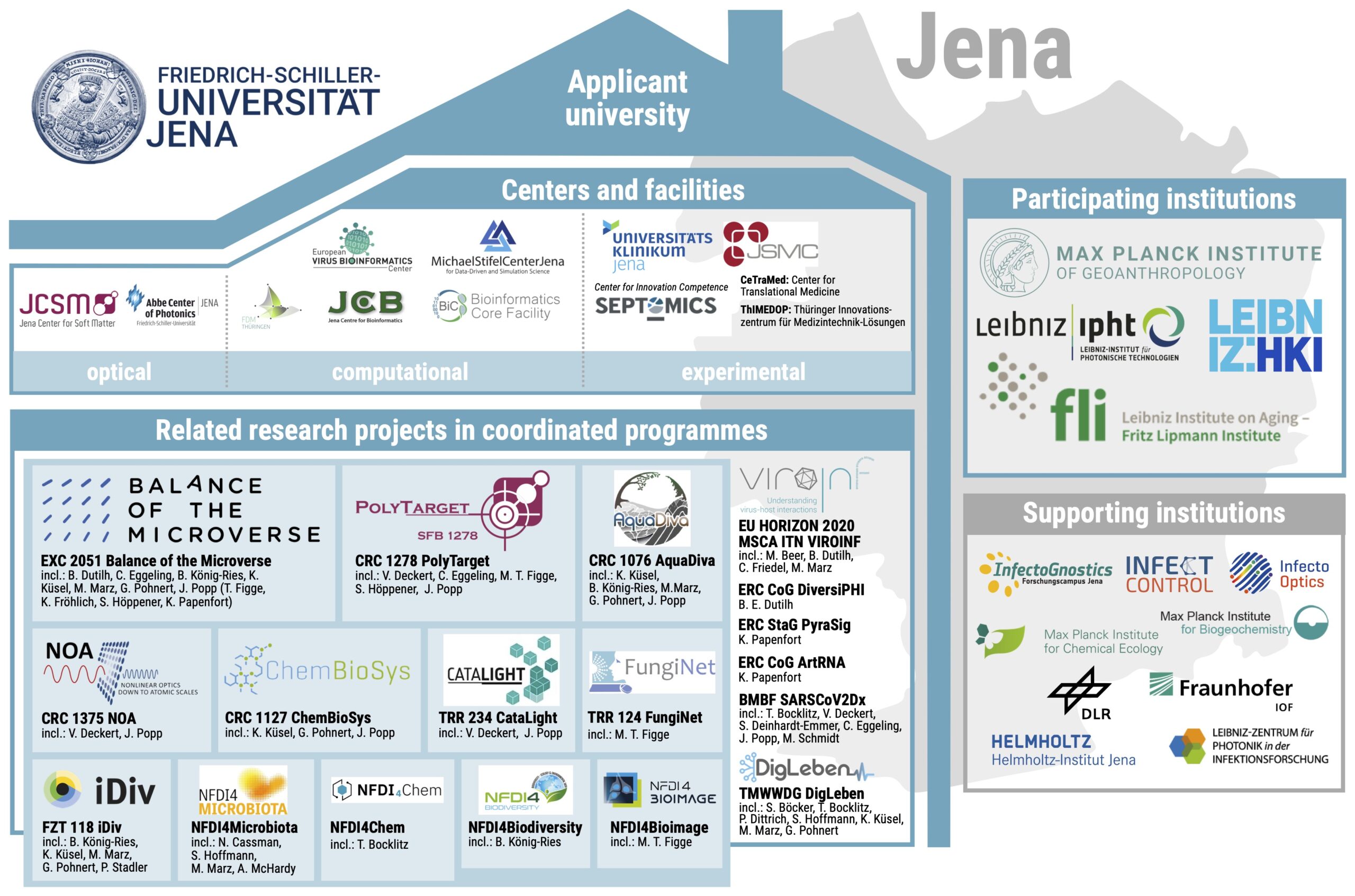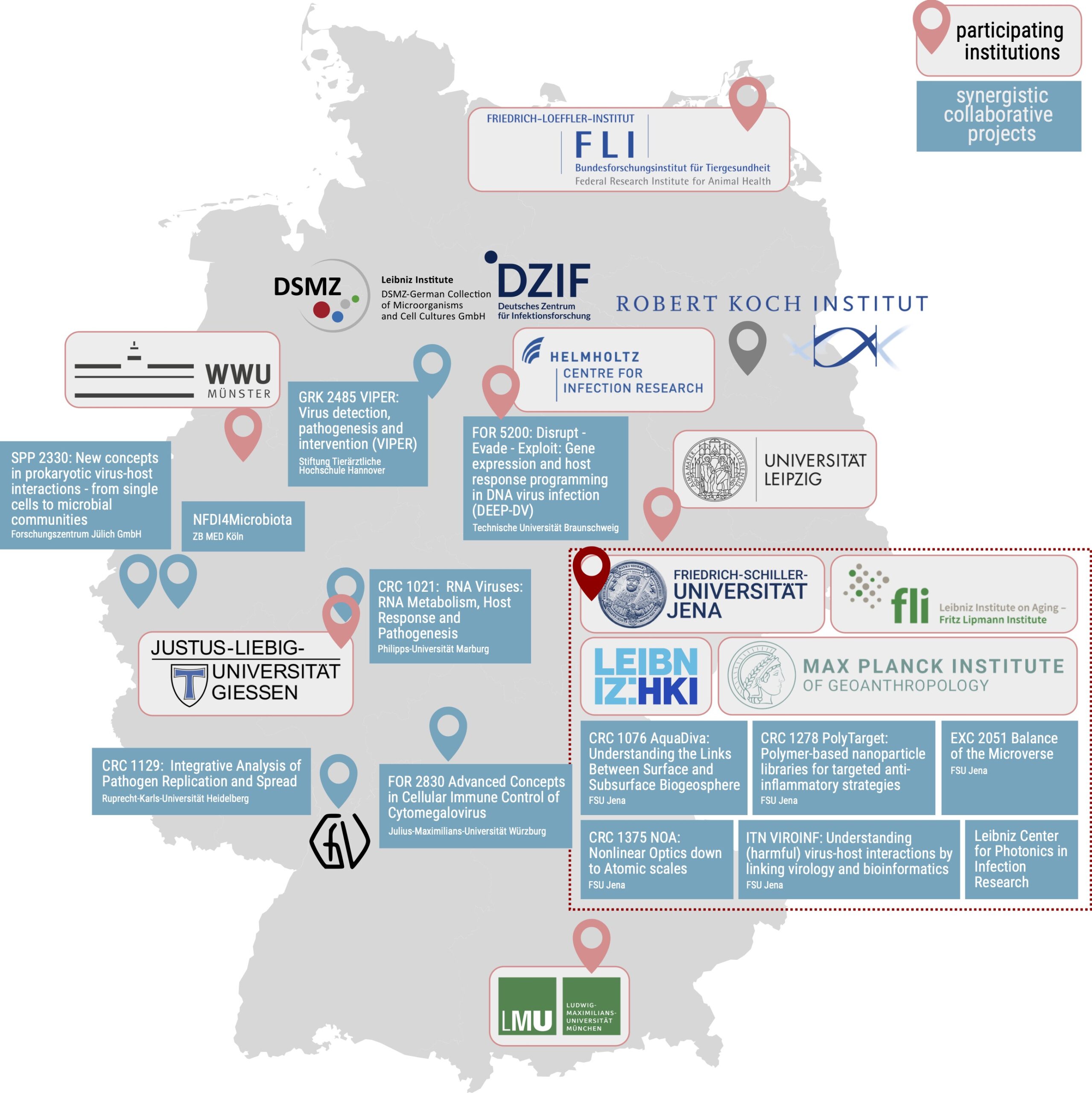
Embedding in the Local and National Research Landscape
The city of Jena, with its outstanding facilities in virus bioinformatics, photonic research, and microbiology, serves as the perfect hub for the VirusREvolution initiative. This vibrant city is at the forefront of these fields, positioning it as the ideal location for uniting cutting-edge advancements. By leveraging Jena’s expertise, VirusREvolution aims to advance our knowledge of viral genomes, morphology, adaptation, evolution, and replication mechanisms. Through collaboration, this initiative will establish a robust research network encompassing bioinformatics, microbiology, virology, and photonics, creating significant value across various institutes, departments, and faculties.

Collective efforts have been dedicated to positioning Jena as the epicenter for virus tool development. In 2017, the FSU established the European Virus Bioinformatics Center, now recognized as the largest of its kind. Remarkably, 60% of the principal investigators involved in the VirusREvolution initiative are integral members of this expansive network. In addition, the Cluster of Excellence Balance of the Microverse was established in Jena, which houses a state-of-the-art microscopy center for tracking the smallest particles. In addition, a Bioinformatics Core Facility was established, which also provides valuable assistance in experimental setup. In 2020, the Marie Skłodowska-Curie ITN VIROINF was started, aimed at unraveling the intricacies of virus-host interactions, particularly those of a harmful nature. By linking the fields of virology and bioinformatics, this initiative contributes significantly to the understanding of these interactions. In 2021, as one of the NFDI4Microbiota applicants, FSU established a virus database working group that will work closely with the VirusREvolution initiative.
Already in 2009, the Friedrich Schiller University set the first milestone in Jena for interdisciplinary infection research combining systems biology basic research with clinical and translational research, with the establishment of the cross-faculty and cross-institute research center Septomics. Presently, Jena proudly hosts a multitude of academic centers specializing in biomedically applied photonic technologies. These include the research-campus InfectoGnostics, the Leibniz ScienceCampus InfectoOptics, the Jena Abbe Centre of Photonics (ACP), the Centre for Translational Medicine (CeTraMed), the Centre of Medical Optics and Photonics (CeMOP), and the Jena Centre of Soft Matter (JCSM). Collectively, these institutions contribute to the city’s thriving ecosystem of research and innovation in infection-related fields.
The University of Leipzig is only an hour’s drive from Jena and works closely with the FSU as part of the Central German University Alliance Jena-Halle-Leipzig. The connection strengthens the regional research landscape. Joint programs have been established in the direction of microbiology, for example, the German Center for Integrative Biodiversity Research (iDiv) Halle-Jena-Leipzig.

VirusREvolution will play a central role in the German virus research landscape. Our PIs are involved in further collaborative projects with researchers from other German universities and institutions. The selected scientists from outside Jena play leading roles on a national and international level. The results from VirusREvolution will be of high interest to other research groups and national institutes within and beyond Germany, for example, the German Center for Infection Research (DZIF), the German Collection of Microorganisms and Cell Cultures (DSMZ), federal institutes Friedrich Loeffler Institute (FLI), and Robert Koch Institute (RKI), and the Helmholtz Centre for Infection Research (HZI).
